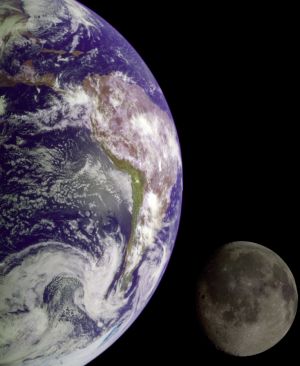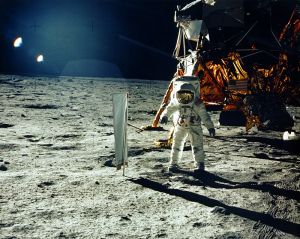

In only the last few centuries, human beings have created new technologies that have affected virtually all life, and changed the face of the planet. These technologies have ranged from advances in medicine, the development of new forms of energy, space travel, computerization, artificial intelligence, and much more - all very impressive achievements covering virtually every aspect of our lives.
Our technological achievements have also resulted in technological side effects that have impacted us equally. Some examples include nuclear proliferation, climate change, extreme population growth, excessive resource consumption, environmental damage, pollution, and man-made viruses. This book is about how technological side effects such as these, which have accelerated geometrically in the last few centuries, may well be the biggest threat to the future of Life and Earth. Furthermore, it is about how the human species might change in order to improve our chances of survival, as these side effects become an increasing part of our lives.
We are often presented in movies with stories of asteroids colliding with Earth or imaginative scenarios of aliens threatening the planet. In such cases, there is a planetary bonding where countries forget their differences, combine their efforts and resources, and take on the threat together. Could it be though that our real concern is not so much asteroids or aliens but something else right under our noses? Could it be that we should be more concerned about how we move forward with our technologies, and the side effects that will come of them? Must we wait until their impact on Life and the planet is so threatening that we must bond together to deal with them, as is suggested we might do in the movies for some common enemy?
Even more concerning than the technological side effects that we face now are the complex and powerful ones we will likely face in the future. These may impact us in ways that we cannot even imagine. Hopefully, if this does occur, we will have the time and resources to deal with them collectively. I think such a time is only years or decades away, and in order to prepare for their unpredictable impact on Life and the planet, I believe a change in how the human species behaves will be necessary - a change that may already be grossly overdue.
It is important to note that I am not suggesting that technology is bad. Indeed, it will likely be our technology that allows us to colonize other planets and overcome natural threats such as asteroids impacting the planet. In addition, I personally enjoy that technology has allowed us the means to keep warm, have fresh food on a whim, and travel distances that one could only imagine. It is only that, if we are going to move forward with our technologies, the countries of the planet must be willing and able to bypass their differences and make a concerted effort to handle the significant potential side effects that we are likely to face from them.
I believe countries are moving forward with new technologies too rapidly and too carelessly on their own agendas thereby placing the future at risk. This is seen, for example, by the presence of global climate change, which may largely be a result of carbon emissions from human technology. While countries distance each other by making their own economic interests and beliefs their priority, it is a time when they should instead be aligning themselves on the same page to deal with the complex changes due to our technologies. I propose that only through integrating their efforts, and moving in the direction of globalization, or at least finding some all encompassing Universal Philosophy that countries can agree on regarding how the human species behaves, will they be able to improve the chances of survival for Life and Earth. I believe the incorporation of such a set of guidelines or philosophy is possible, even withstanding the many differences that countries and cultures have regarding economic interests and belief systems.

It will be especially important that the leaders of the most influential countries impacting the planet take a significant role in implementing this change. For a start, this would include some of the greater economic powers like Russia, the European Union, China, India, the U.S.A., and Canada. One might suggest that this is a task for the United Nations, and idealistically this may be true, but realistically, economic power in a large part rules our lives and the planet. Hence, the support of the economic powers is required for the necessary changes to occur.
I sometimes wonder which leader(s) will be first to step forward along with the required support of their parties, population, and allies, then successfully become the example that other countries can follow in order to benefit the planet, not just their own countries. The easy part will be to use science to illustrate that we have problems related to our technologies that affect all of us. The monumental task will be to actually exhibit the global diplomacy required to convince those with differing economic interests and beliefs to change. The argument for change will need to be strong enough to convince the rest of the world to accommodate their belief systems and sacrifice many of their economic interests. It remains to be seen if a leader, or maybe a group of countries, will be able to initiate the change required to ensure the best future for Life and Earth.

It is my hope that some of the ideas in this book will help individuals, cultures, countries, and leaders see that it is logical, and becoming more urgent, that we apply more of our resources to the welfare of the planet, and not just toward ourselves.
Since Earth came into existence over 4.5 billion years ago, species have come and gone. Through an endless struggle, life has endured until today where human beings have come to dominate the planet, accompanied by well over 1 million other species of life. This tiny planet we call Earth, hurtling through space, about 24,000 miles around from day one to now, is the one and only home to life as we know it.
The future of the human species, and indeed that of all life on this planet, has in the past been influenced only by natural disasters like climate change and possibly asteroids colliding with Earth. It may be that their devastating effects even caused the dinosaurs to become extinct. Though these natural threats, along with others, will continue to exist in the future, the side effects of technologies created by humans have become even greater threats to Life and Earth. This is because they are world impacting, and they have become more complex and more powerful over the last few decades, a single grain of sand in the hourglass of the evolutionary time scale.
I want to emphasize that human beings have not always represented a concern to the welfare of Life and the planet. It is only in the last few centuries, a small fraction of our existence, that we have developed complex and powerful technologies that can not only protect Life and Earth, but also threaten it in ways that no natural disaster ever could. As an example, it is very probable that if all the nuclear weapons on the planet were detonated at once, they would destroy our atmosphere and possibly all life. Though this is an unlikely event, this possible threat has clearly come to exist only due to technologies that human beings have created in the last century.
You and I are part of a species at a stage in our evolution when we can do great good, and also great damage to Life and the planet. We can threaten its existence in ways that have never occurred in the past. Where greater caution should be taken, we instead follow our instinctive ways of competing with each other over our economic interests and our beliefs. Clouded by the ways of our primitive past, we continue to play out our script of survival of the fittest between individuals, cultures, and countries. While we are so familiar with surviving through competition , a more "cooperative" approach may be warranted given the new presence of complex and powerful technologies. Though human life has adapted somewhat in taking a cooperative approach it is yet far from adequate.
This book is therefore about how the countries and cultures of the world choose to cooperate in the presence of our unfolding world impacting technologies. Ultimately, it is about your survival, the survival of all species, and that of the planet Earth. At this point you may have decided that such concerns do not apply to you because they are:
NOT IMPORTANT - such concerns are impractical to your life since you already have more important daily routines to attend to.
UNLIKELY AT ALL - you may feel it is improbable that we will see problems given there has never been a problem in the past, and if we do have one, we will just fix it.
IRRELEVANT NOW - if there is a problem, it does not matter to you since it won't occur in your lifetime.
HOPELESS ANYWAY - you may feel there is no point in concerning yourself since there is nothing that we can do about it anyway given that many believe we cannot change human nature.
BEYOND YOU - finally, you may feel that you are just one person and you can't make a difference in the grand scheme of things.
If any of these sentiments reflect your feelings, you should not feel alone. Obviously there are many reasons not to concern ourselves about what occurs outside the circle of our own lives. Ultimately though, this book, and the entire question of our survival, is about whether we as individuals, cultures, or countries, should be less concerned about ourselves and more concerned about the world that we are a part of.
What you are about to read is more than just a viewpoint of what someone thinks might or might not happen in the future. Given the deep understanding required to determine the choices necessary to ensure our best future, and understand what prevents us from making these choices, a lot of philosophical questions surrounding our existence, our values, and our beliefs must be dealt with. Be prepared to go on a philosophical journey full of analogies and ideas that may answer some of those puzzling questions about life that you have always wondered about. After you have finished your journey, I hope you will come to realize that each of us can make a difference and that our choices on how we work together do matter.
Some may feel a bit overwhelmed with the topics to be discussed but such concerns are unwarranted. For example, think of Sherlock Holmes, the famous detective. An educated policeman may have had all the clues of a murder case lying before him, yet he was not able to solve the case. Sherlock Holmes though, with his intuitive ability to clearly see the relationship between the same clues, was able to solve the crime in a moment. This is why in "Life and Earth" I have tried to approach the puzzle of understanding life by using analogies to help us connect the clues. Analogies are something we can all relate to, and they can help simplify things and release our minds of false assumptions that may prevent us from finding the answers we seek.
The analogies I use are objects of matter and energy that we can relate to. Some examples used are: our technological side effects spreading like branches on a tree, the big bang of the universe like waves spreading on a pond, and destiny like the balls moving on a pool table. You may be a scientist educated in the highest recognized financial institution, a farmer in the desert living the most basic life, a homeless person possibly without the same opportunity as others may have, or even a student who has yet to learn so much about the world. Regardless, it may already be in you to be able to answer the puzzles of life and participate in making the future for Life and Earth a good one.
Many of the ideas presented in this book have been compiled in the form of a story in a section called How a Planet Survived. You are also welcome to email me with comments at bob_lifeandearth@yahoo.ca.

I have mentioned the use of analogies in order to help understand the problems that we face, so let's start with our first one. Imagine a tree like the one to the right. Think now of the branches, each representing a problem that we may face due to our technologies. Some are big, and some are small, and of course, we do not know when new branches will come to grow on the tree. One branch might represent our incredible population growth in the last few centuries due to our revolution in agricultural technology. Others might be the possibility of nuclear conflicts, worldwide resource depletion, or possibly global climate change. One thing we can agree on is that there are many branches representing many problems related to our technologies. In addition, they are ever changing and, as our technologies become more complex, we will see new branches representing new side effects of our technologies.
Now think of the base of the tree from which all branches originate as the different countries of the world. All of the complex side effects, the branches, stem from the base, but it is not the branches (the technological side effects) that matter as much as how countries work together at the base to handle the technological side effects. How well the tree grows, and in which direction, depends on us. There will always be new technological side effects, but how the nations of the world deal with them TOGETHER, at the source where they stem from, will ultimately determine its survival.
We should give great credit to those groups and individuals who confront the various problems that the world faces (e.g. environmental groups) related to our technologies, but I believe that how the countries of the world work through our problems is even more important than the problems themselves.
As the impact of technological side effects become more powerful, and more common, we will always find new branches on the tree - new side effects from our technologies. Ultimately it will become imperative that the countries of the planet - the trunk of the tree - work together with global policies to deal with these problems to ensure a bright future for all Life and Earth.

This tells us that we must focus on why countries, cultures, and even individuals, have so much difficulty working together toward common goals. Such an example would be the 2009 Copenhagen Climate Summit where the summit of most major nations of the world did not result in a legally binding deal, or any commitment to reach one in future. The reason was mainly due to conflicting economic interests and politics. Something we are about to discuss in the next section.
Indeed, many countries do acknowledge the many side effects from our technologies, like climate change and nuclear proliferation. They also attempt to resolve them, but this is nearly an impossible task at a global level given that the planet is fragmented into countries driven by competing beliefs and economic interests. If countries continue to only focus on their own interests, how can we have a system to implement global policies that will benefit all Life and Earth? As each country moves forward with new technologies on their own agendas, are we all drifting deeper into uncharted waters, while at the same time neglecting to give the attention we should to the side effects of our technologies? For example, our atmosphere affects all of us, yet some countries allow coal burning for their own economic benefit. At the same time, though at a greater expense and possibly making them less competitive, others adopt cleaner energies more accommodating of the planet. We must work together to deal with the impact of our technologies on Life and Earth.

As we move forward with new technologies, whether by breaking down the atom or reaching for the stars, it is inherent that we will continue to manipulate matter and energy. This will create new situations that have never, or rarely, occurred before in Nature (e.g. man-made viruses, cloning, genetic engineering, and nuclear energy). Of course we will try to minimize the side effects of our technologies, but given that their impact on Life and Earth is greater than ever before, the countries of the world need to be more prepared. They must be able to implement global policies swiftly and firmly in order to deal with problems related to our technologies. Together we must be able to control the use of nuclear weapons worldwide, set global laws to stop CO2 emissions, prevent inhumane acts toward all life on a global scale, and ensure complete research on the side effects from world-changing technologies before adopting them. I believe we are at a critical point in the evolution of our species - a juncture - where the countries of the world must work together to ensure the healthy survival of Life and Earth.
In all the time that the human species has been on this planet, countries have come and gone due to wars over various disagreements. Most often, these have been over religion or competing economic interests, and countries have been able to play them out. Ultimately though, our disagreements could never threaten our existence, or that of the planet, but this may no longer be the case. The playing field has changed in the last few centuries and, in the presence of our unfolding technologies, the world working as One is no longer just a dream for idealists. It is now a matter of survival. Countries must see beyond their egos, patriotic nature, and their own borders. They must bypass differences in beliefs and economics and take the next step in the evolution of humankind and connect with some type of Universal Philosophy. Though we are of different cultures, colour, wealth, and religions, we must see also that we are a part of one family - the family of living creatures. We are all resting on a very fragile planet of limited size, which is going through unprecedented change that we have created.

As we continue to evolve, technology will give humankind, all Life, and the planet, greater and greater benefits. While these benefits will be incredible, we will also experience a significant increase in the side effects from our technologies.
I have heard many people suggest that, when faced with disaster in the past, there have always been survivors. Nature will look after us. My concern is not so much about the technology that exists today though. It is about what is likely to come. The trend is clear over the last 100 years. We probably cannot even imagine the technology and associated side effects that lie ahead of us.
Visualize yourself as a farmer living 100 years ago ploughing your land in the evening with your horse. You stop for a moment and look up at the big light in the sky called the moon. You would never have conceived at that time, that one day, humans would be able to take a journey in a space ship and walk on that light, but we have done such a thing. Imagine that you are a knight sharpening your sword preparing for battle. You would never have conceived that one day there might be such a weapon as a nuclear bomb that could destroy an army as if one could think away the enemy in a second, but we have created such a thing. My point is, that now we see nuclear bombs, global warming, and genetic engineering. What can we expect in 20 years from now, or 100 years from now? Is there a recipe for a nuclear bomb 1000 times stronger that we will unlock? Will we create a computerized virus able to think and adapt on its own? What can we do? What will we do? Whether by design or accident, technology is bound to affect the planet in ways never experienced before. In only 100 years the farmer would see what he could never imagine - a man on the moon. In 100 years, will we also see things that we cannot even imagine?
It is time, as a part of our evolution, for all humankind to look upon ourselves as a species, and re-evaluate our place in the universe. We can no longer just pretend that we are subjects of Nature, like other creatures that wander upon this planet called Earth. We have impacted the world around us a great deal, and in so doing, changed the tradtional flow of evolution significantly, in both good ways and bad. We now must become the intelligent observers, and responsible custodians of the planet, for the welfare of ourselves, and for that of all Life on this planet.
The manner in which our technologies are affecting humans, other life, and the planet, is only a part of a greater responsibility that we must consider. That is our responsibility to the future generations of all life. Consider that in the last 100 years, only one century, humans have impacted life and reshaped the planet with their technologies. They will continue to do so in the coming decades, possibly through the use of nuclear weapons, with AI, or our impact on the atmosphere. What about the future generations of life over the next one million years? Humans have survived in the absence of our technologies for over one million years. They have faced natural threats such as ice ages, asteroid impacts, volcanoes, and other natural disasters. It would seem highly probable that life could endure another million years on this planet, even in the absence of our technologies, which may carry with them existential risks.

Imagine that each century from one million years ago, to one million years from now, is like a link in the "chain of life". That would mean the chain of life so far had gone on for 10,000 links in the past, and we might expect 10,000 or more in the future. Each link would represent billions of creatures that might enjoy the pleasures of life in their century in the future. Aside from the good that our technologies bring, they also may carry with them existential risks that might break the chain of life. Imagine the responsibility that we have, not only to life in our century, but to the billions of creatures that may or may not come to exist if we are careless with our technologies. It seems an unfathomable thought that future generations might suffer, or even never come to exist, simply due to the carelessness of humans today. Can the inventors, and those that implement such technologies as AI, nuclear weapons, and biotechnology, honestly say that they are considering how their creations will impact life over the next 10,000 centuries? Do they really consider the side effects of our technologies as they create them, or do they simply find it adequate to offer a disclaimer that it is "improbable" that there will be existential results? I suggest that a new global perspective be incorporated by world leaders. It should emphasize the responsibility that humans have today toward future generations, not just to our current generation. This might be done through the introduction of a Global Education System (GES) to complement education systems that already exist in different countries.
Planning our future may mean that countries and cultures may no longer be able to afford the luxury of competing with each other over beliefs and economic interests as they have done in the past. They must recognize that our technologies are a new wildcard in evolution, affecting all life and the entire planet. We are responsible for its future. In order for Life to endure as it has in the past, countries and leaders must look beyond their economic, territorial, and cultural differences. They must learn to work as one. They can then carefully plan the future of humankind, all Life, and the Earth. Humankind must now ask this great philosophical question.
"What is the future we want for Life and Earth, and how are we going to achieve this together"?
It is easy to suggest that world leaders take responsibility and plan the future for ourselves, and for future generations, but is this really possible? Where do we start?
In edition 5 of "Life and Earth", a new section called
The First Step has been added. This section deals specifically with answering this question of how we might collectively plan our future. The basic suggestion is that all countries on the planet take an organized approach to bringing together their greatest minds. This would include philosophers and scientists and others that might be able to contribute. Through such an organized and unbiased approach to understanding Life, they might be able to create a type of Universal Philosophy that leaders could use to help guide us into our best future. You will find
The First Step
an interesting section that proposes questions touching on the meaning of our very existence.